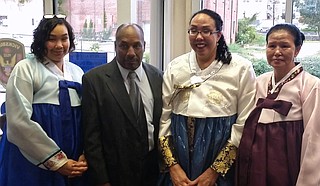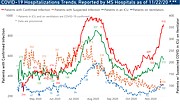Wednesday, November 25, 2020
Angela Reddix first had to argue with her father, George Long, to get him to take COVID-19 seriously. It was love for his wife and grandchildren that convinced him to cancel Thanksgiving. From left: Selina Long, George Long, Angela Reddix and Yu-Sun Long. Photo courtesy Reddix Family
When coronavirus came to Mississippi, Angela Reddix had a plan. An educator for over a decade, she became a homemaker after a series of medical operations took a toll on her health. She had already learned to cope with home isolation—now her family had to master the same skills.
"When all this came around, I said 'here's the game plan,'" Reddix told the Jackson Free Press in a Nov. 17 interview. Reddix and her mother have Marfan syndrome, a genetic disorder that often damages the heart. For the fall semester, Reddix's stepchildren have remained in virtual classes, a transition they've struggled with at times.
Even more difficult is the looming question of holidays. The kids, 6 and 8 years old, have grown accustomed to their holiday visits to see Reddix's parents: George and Yu-Sun Long, often at their aunt's home in South Mississippi. Yu-Sun, whom the children call halmoni, is the heart and soul of the family.
"Watching my children and their grandparents bond has been magical," Reddix said. She laughs, remembering the first visit after her Yu-Sun learned her step-granddaughter loved tomatoes. She had eight pounds straight from a Mississippi hothouse waiting on the kitchen counter when they arrived. "Mom," Reddix said, "she's only 38 pounds herself." Yu-Sun was unmoved. "I didn't want her to be hungry," she reasoned.
When Reddix speaks about her father, George, there is an unmistakable pride in her voice. Born in Iuka, and experiencing school integration as a student himself, he looked to the U.S. Army for an opportunity to expand his horizons. There, in a posting in South Korea in the late 1970s, he met Yu-Sun.
They returned to America together, married in a court ceremony in Texas, and not long afterward, Angela and her sister Selina arrived. In their childhood they lived the lives of Army brats, across America, to Germany, to Korea and back again.
Years later, the Longs returned to Iuka, to be near family, opening an automotive business. In the '90s, George became the first Black alderman of the mostly white town, an undertaking Reddix remembers as tinged with danger.
"We weren't allowed to answer the phone while he was running," his daughter said, in case they received threats. Living out in the country, they had always had rifles in the house. But during his campaign, Reddix said, "there was always a shotgun next to the door."
With the arrival of COVID-19, the qualities Reddix cherishes most about her parents intersected in a way she could never have expected.
"When it came around, he was so laissez-faire," Reddix said of her father. "He's older, in (his early 60s) but he's still very sprightly. He used to run marathons, compete in arm-wrestling competitions. He's strong. Looks younger than his age."
He does. It took no small amount of bickering for Reddix to communicate the danger of the virus to her father. To George, it was like the flu. He'd lived through bad flu seasons. "But it's not the flu, it's worse than the flu," Reddix explained. "It affects the cardiovascular system."
Still, he was willing to take the risk. George Long was not a man who made it through life cringing at the prospect of putting himself in danger.
"He's very social," Reddix said. "He loves going to the auctions, loves going to church," where he is a deacon.
Finally, Reddix put it in terms he simply could not ignore. "It's not about you," she said. "It's about mom. You could give it to her. It could be you! Mom can't die alone in a hospital. How are you gonna tell the grandkids?"
Reddix could see the moment of realization dawning.
"How are you going to tell the grandkids?" This was the question that convinced George Long to cancel his Thanksgiving plans. This was the question that convinced him to wear a mask, to minimize his social life for the duration of the pandemic.
George loves his grandchildren. He loves his wife, Yu-Sun. And perhaps more than anything he loves the budding relationship between the children and their halmoni: the way she sneaks them food between mealtimes, the way they sprint to see her when they come to visit. This is what motivates him to pay the heavy price that is a year without tangible family togetherness.
Not fear, but love.
'We Need The World To See'
It would be comforting to think that the Long family is a microcosm of Mississippi, a family unit willing to make the hard decisions necessary to protect each other—planning ahead with the needs of the vulnerable in mind.
But this has simply not been the case. Mississippi, alongside the rest of America, now hurtles toward a peak of viral spread beyond anything seen in the long months of 2020 so far.
Over the last week, numbers of upward of 1,300 cases per day became commonplace. On Nov. 21, the Mississippi State Department of Health reported 1,972 new cases of the virus, the all-time peak. That data point lifted the seven-day average of new cases to 1,294, comparable only to the highest three days in the entire pandemic.
A tidal wave of COVID-19 patients continues to surge into hospitals around the state, from 680 on Nov. 14 to 910 on Nov. 22. And accompanying them are the critically ill ICU patients that so overburdened the state's hospital system in the summer.
Lee Bond, chief executive officer at Singing River Health System, which includes multiple Gulf Coast hospitals, released a public statement warning of a sudden, sharp spike in hospitalizations on the coast.
"We hit a new high of 52 COVID inpatients one day earlier this week," Bond explained. "Twice in the last week hospitals across the coast from New Orleans to Mobile were largely on 'diversion,' implying that they were saturated to the point that they could not take more patients."
A nationwide hospital shortage would represent a catastrophe beyond imagining. Regional crises can be handled by moving patients away from the epicenter, allowing the nearest hospitals to make room for the nearest patients. A decentralized pandemic surging in every state in the U.S. renders that backup plan void.
"We need the world to see that most hospitals are on diversion. If the trend does not change, soon there may be nowhere to divert people to," Bond said.
That message echoed loudly at a University of Mississippi Medical Center press conference on Nov. 23. There, Dr. Alan Jones, assistant vice chancellor, warned that the unprecedented spike in hospitalizations was being replicated across the nation.
"Regionally and even beyond, hospitals are struggling," Jones said. "ER at baseline is a pretty chaotic, unpredictable place ... when you layer something highly infective like COVID on top of it, it becomes exhausting."
During the summer spike, Mississippians were transferred out of state for critical care, to Louisiana, to Missouri. Now those same states are transferring patients into Mississippi for lack of available beds and staff.
Dr. LouAnn Woodward, vice chancellor for health affairs and dean of the School of Medicine, ended the press event with a plea for stronger measures. "The county-by-county approach is not working," she acknowledged. "We need a statewide mask mandate."
Even more, the state needs a population that avoids large holiday gatherings.
At a Public Health and Welfare Committee meeting in the Mississippi State Senate, State Health Officer Dr. Thomas Dobbs appeared despondent at times, even before being peppered with bizarre, false conspiracy theories—about fantastically inflated death tolls and nefarious nanotechnology hidden in the coming vaccines—legislators said their constituents had inundated them with.
His testimony hinted at the true impact of the pandemic on the state, beyond the presently confirmed totals. "Thus far we've had 5,000 more deaths than we've expected. 5,000 people have died who would not have died without COVID-19."
The cyclical failure to improve wearied him. "I'm exhausted trying to convince folks," Dobbs admitted. "It's just going nowhere."
If You Love 'Em
In an interview with the Jackson Free Press, George Long was plain-spoken about his commitment to protecting his family. "People ask me, 'why you got this mask on?' I say, because this COVID is real. It just doesn't make sense for me to put my wife in a position where she could be in danger," he said, adding a simple message for those on the fence: "Live today so you can enjoy tomorrow."
Reddix, like the rest of us, watches the growing number of COVID-19 cases with an anxious unease. When she speaks about her parents' love, her voice is tender with emotion, never far from tears. But when she considers the state of the virus, and the often callous response to the susceptibility many like her have, it sounds more like resignation.
"You love someone who is in an at risk group," Reddix warned. And, even if you don't—"you love someone who loves someone who's vulnerable." That is the heart of the matter—the cruel hyperconnectivity that makes collective action the only defense against coronavirus.
The disease, virulent, stealthy, and deadly as it is, does not just threaten us as individuals. It does not just endanger those around us, the ones we attempt to protect every day. Coronavirus is equally deadly to friends and family as it is to orbiting acquaintances we've never really met. It imperils relationships we may never have considered the significance of.
In parting, Bond told the Jackson Free Press that Singing River has a motto for the approaching holidays. "If you love 'em, don't hug 'em," he warns. It is a good rule of thumb. But one part can be omitted. Coronavirus spreads too fast and too far to demand a specific object in need of protection. You do not need to love someone in particular to make the hard decision to avoid holiday gatherings this year. You simply need to love.
Contributing reporter Julian Mills assisted in this report. Email state reporter Nick Judin at [email protected].

